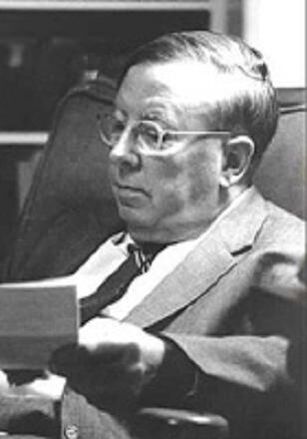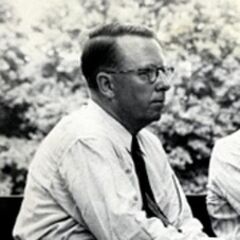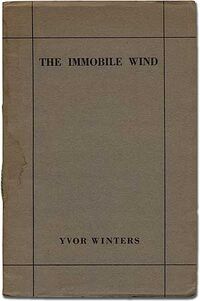
Yvor Winters. Courtesy PoemHunter.
Arthur Yvor Winters (October 17, 1900 - January 25, 1968) was an American poet, academic, and literary critic.
Life[]
Youth and education[]
Winters was born in Chicago, Illinois, the son of Faith and Harry Winters. He grew up in Eagle Rock (near Pasadena), California.[1]
In 1917-1918 he attended the University of Chicago, where he was a member of the Poetry Club, which also included Glenway Wescott, Elizabeth Madox Roberts, Monroe Wheeler, and his future wife Janet Lewis.[1]
Winters was diagnosed with tuberculosisin the fall of 1918. He moved to Santa Fe, New Mexico, where he recuperated in a sanatorium and wrote his early poems, which were published in 1921 and 1922. Leaving the sanatorium in 1921, he taught school for 2 years in Madrid and Los Cerilos, New Mexico.[1]
In 1923 he entered the University of Colorado, where he earned B.A. and M.A. degrees by 1925.[1]

Courtesy The Poetry Archive.
Career[]
From 1925 to 1927 Winters was a language instructor at the University of Idaho. He married poet Janet Lewis on June 22, 1926; the couple would have 2 children, Joanna and David.[1]
Winters enrolled at Stanford University in 1927,[1] and began teaching in its English department the following year. He earned a Ph.D. from Stanford in 1934.[2]
At Stanford, his students included poets Thom Gunn, Donald Hall, Jim McMichael, N. Scott Momaday, Robert Pinsky, John Matthias, Moore Moran, and Robert Hass, and critic Gerald Graff. He was also a mentor to Donald Justice and J.V. Cunningham.
He edited Gyroscope, a literary magazine, with his wife from 1929 to 1931; and Hound & Horn from 1932 to 1934.
In his criticism Winters championed the idea that a work of art should be 'an act of moral judgement', and attacked such literary icons as Henry James and T.S. Eliot. Despite once being denounced by Stanford's English department head as "a disgrace to the department," he remained at Stanford until 2 years before his death.[2]
Writing[]
Poetry[]
Winters's early poetry, which appeared in small avant-garde magazines alongside work by writers like James Joyce and Gertrude Stein, was written in the modernist idiom, and was heavily influenced both by Native American poetry and by Imagism. His essay, The Testament of a Stone, gives an account of his poetics during this early period.
Around 1930, he turned away from modernism and developed an Augustan style of writing, notable for its clarity of statement and its formality of rhyme and rhythm.
Criticism[]
Winters's critical style was comparable to that of F.R. Leavis, and like Leavis he created a school of students (of mixed loyalty). His affiliations and proposed literary canon, however, were quite different: Edith Wharton's Age of Innocence above any single novel by Henry James, Robert Bridges above T.S. Eliot, Charles Churchill above Alexander Pope, Fulke Greville and George Gascoigne above Sidney and Spenser.
He attacked Romanticism, particularly in American manifestations, and set about Emerson's reputation as that of a sacred cow.(Citation needed) (Ironically, his earliest book of poems, Diadems and Fagots, takes its title from an Emerson poem.) In this he was probably influenced by Irving Babbitt. He gave the sobriquet "the cool master" to American poet Wallace Stevens.
Winters was sometimes, questionably, associated with the New Criticism, largely because John Crowe Ransom devoted a chapter to him in his book by the same name.
Winters is known for his argument attacking the "fallacy of imitative form:" "To say that a poet is justified in employing a disintegrating form in order to express a feeling of disintegration, is merely a sophistical justification for bad poetry, akin to the Whitmanian notion that a writer must employ loose and sprawling poetry to 'express' the loose and sprawling American continent. In fact, all feeling, if oneself (that is, one's form) is given up to it, is a way of disintegration; poetic form is by definition a means to arrest the disintegration and order the feeling; and in so far as any poetry tends toward the formless, it fails to be expressive of anything."[3]
Recognition[]
Winters was awarded the 1961 Bollingen Prize for Poetry for his Collected Poems.
Publications[]
Poetry[]
- The Immobile Wind. Evanston, IL: M. Wheeler, 1921.
- The Magpie's Shadow. Chicago: Musterbookhouse, 1922.
- The Bare Hills: A book of poems. Boston: Four Seas, 1927.
- The Proof. New York: Coward-McCann, 1930.
- The Journey, and other poems. Ithaca, NY: Dragon Press, 1931.
- Before Disaster. Tryon, NC: Tryon Pamphlets, 1934.
- Poems. Los Altos, CA: Gyroscope Press, 1940.
- The Giant Weapon. Norfolk, CT: New Directions, 1943.
- To the Holy Spirit. San Francisco: Book Club of California, 1947.
- Three Poems. Cummington, MA: Cummington Press, 1950.
- Collected Poems. Denver, CO: A. Swallow, 1952;
- revised edition, Chicago: Swallow Press, 1960; London: Routledge & Kegan Paul, 1960.
- (with introduction by Donald Davie). Manchester, UK: Carcanet, 1978.
- The Early Poems, 1920-1928. Denver, CO: A. Swallow, 1966.
- Uncollected Poems, 1919-1928 (edited by R.L. Barth). Edgewood, KY: R.L. Barth, 1997.
- Uncollected Poems, 1929-1957 (edited by R.L. Barth). Edgewood, KY: R.L. Barth, 1997.
- Selected Poems (edited by R.L. Barth). Athens, OH: Swallow Press / Ohio University Press, 1999.
- Selected Poems (edited by Thom Gunn). New York: Library of America, 2003.
Non-fiction[]
- The Testament of a Stone: Notes on the mechanics of the poetic image. Vienna, 1925.[1]
- The Case of David Lamson: A summary (with Frances Theresa Russell). San Francisco: Lamson Defense Committee, 1934.
- The Brink of Darkness (pamphlet). Concord, NH: 1932; Denver, CO: A. Swallow, 1947.
- Primitivism and Decadence: A Study of American experimental poetry. New York: Arrow Editions, 1937.
- Maule's Curse: Seven studies in the history of American obscurantism: Hawthorne, Cooper, Melville, Poe, Emerson, Jones Very, Emily Dickinson, Henry James. Norfolk, CT: New Directions, 1938.
- The Anatomy of Nonsense. Norfolk, CT: New Directions, 1943.
- Edwin Arlington Robinson. Norfolk, CT: New Directions, 1946; revised edition, New York: New Directions, 1971.
- In Defense of Reason (includes Primitivism and decadence: A study of American experimental poetry, Maule's Curse: Seven studies in the history of American obscurantism, The Anatomy of Nonsense, & The Significance of The Bridge by Hart Crane; or, What are we to think of Professor X?). Denver, CO: A. Swallow, 1943; London: Routledge & Kegan Paul, 1943; New York: Swallow Press / W. Morrow, 1947; Athens, OH: Swallow Press / Ohio University Press, 1987.
- The Function of Criticism: Problems and exercises. Denver, A. Swallow, 1957; London: Routledge & Kegan Paul, 1957.
- On Modern Poets: Stevens, Eliot, Ransom, Crane, Hopkins, Frost. New York: Meridian Books, 1957.
- Modern Literary Criticism (edited by Irving Howe; contributor). Beacon Press, 1958.[1]
- Four Poets on Poetry (by Richard P. Blackmur, Yvor Winters, Marianne Moore, & Mark Van Doren; edited by Don Cameron Allen). Baltimore, MD: Johns Hopkins University Press, 1959.
- The Poetry of W.B. Yeats (pamphlet). Denver, CO: A. Swallow, 1960.
- The Poetry of J.V. Cunningham (pamphlet). Denver, CO: A. Swallow, 1961.
- Elizabethan Poetry: Modern essays in criticism (edited by Paul J. Alpers; contributor). New York: Oxford University Press, 1967.
- Forms of Discovery: Critical and historical essays on the forms of the short poem in English. Chicago: A. Swallow, 1967.
- Uncollected Essays and Reviews (edited by Francis E.X. Murphy). Chicago: Swallow Press, 1973; London: Allen Lane, 1974.
Edited[]
- Twelve Poets of the Pacific. Norfolk, CT: New Directions, 1937.
- Elizabeth Daryush, Selected Poems. New York: Swallow Press, 1948.
- Poets of the Pacific: Second series. Stanford, CA: Stanford University Press, 1949.
- Quest for Reality: An anthology of short poems in English (compiled with Kenneth Fields). Chicago: Swallow Press, 1969.
Letters[]
- Hart Crane and Yvor Winters: Their literary correspondence (edited by Thomas F. Parkinson). Berkeley, CA: University of California Press, 1978.
- Dear Miss Yamamoto: The letters of Yvor Winters to Hisaye Yamamoto (edited by R.L. Barth). Ardmore, PA: Fifth Season Press, 1999.
- Selected Letters (edited by R.L. Barth). Athens, OH: Swallow Press / Ohio University Press, 2000.
Except where noted, bibliographical information courtesy WorldCat.[4]

Defense of Empire By Yvor Winters Poetry Presentation

'Alone' by Yvor Winters

At The San Francisco Airport (Yvor Winters Poem)

Fine Poetry - Poems of Yvor Winters
Audio / video[]
- Yvor Winters (LP). Washington, DC: Library of Congress, 1954.
- Yvor Winters Reads His Works (LP). New York: Carillon, 1961.
- Yvor Winters Reading at Stanford (LP). Stanford, CA: Stanford University, 1984.
Except where noted, discographical information courtesy WorldCat.[4]
Poems by Yvor Winters[]
See also[]
- Yvor Winters's alternative canon of Elizabethan poetry
- Stanford School poets
- List of U.S. poets
- List of literary critics
- Timeline of American poetry
References[]
- The Complex of Yvor Winters' Criticism (1973) Richard J. Sexton
- Hart Crane and Yvor Winters (1978) Thomas Francis Parkinson
- An Introduction to the Poetry of Yvor Winters (1981) Elizabeth Isaacs
- Language as Being in the Poetry of Yvor Winters (1980) Grosvenor Powell
- Wisdom and Wilderness: The Achievement of Yvor Winters (1983) Dick Davis
- In Defense of Winters (1986) Terry Comito
- Champion, Rafe (2002). "Winters: A Man For All Reasons". http://www.the-rathouse.com/YWinters_essayRC.html.
Notes[]
- ↑ 1.0 1.1 1.2 1.3 1.4 1.5 1.6 1.7 Yvor Winters, Poetry Foundation. Web, Mar. 9, 2019. Cite error: Invalid
<ref>tag; name "ywinterspf" defined multiple times with different content - ↑ 2.0 2.1 Yvor Winters, Poets.org, Academy of American Poets. Web, Mar. 11, 2014.
- ↑ Primitivism and Decadence: A study of American experimental poetry, 1937. Print.
- ↑ 4.0 4.1 Search results = au:Yvor Winters, WorldCat, OCLC Online Computer Library Center Inc. Web, Apr. 27, 2015.
External links[]
- Poems
- "The Immobile Wind"
- 3 poems by Winters: "An October Nocturne," "Much in Little," "Moonlight Alert"
- 2 examples of Winters's Early Imagist Poetry
- Yvor Winters 1900-1968 at the Poetry Foundation
- Winters in Poetry: A magazine of verse, 1912-1922: "Montezuma," "Wild Horses," "On the Mesa," "Concerning Blake," "The Old Weep Gently," "Little Rabbit," "Two Songs of Advent," "Hawk's Eyes," "The Far Voice," "The Walker," "Ballad," "The Immobile Wind," "Song for a Small Boy Who Herds Goats," "Ballad of Men," "The Priesthood," "Where My Sight Goes," "Death Goes before Me," "The Little Deity Alone in the Desert," "Late Winter," "A Requiem for the Memory of Bees," "Chicago Spring," "Old Spring," "The Silent Days," "Lament, beside an Acequia, for the Wife of Awa-tsireh," "The Fragile Season"
- Yvor Winters at PoemHunter (28 poems)
- Books
- Audio / video
- Books
- Yvor Winters at Amazon.com
- About
- Yvor Winters profile at the Academy of American Poets.
- Yvor Winters in the Encyclopædia Britannica
- Yvor Winters at NNDB
- Yvor Winters (1900-1968) at Modern American Poetry.
- Yvor Winters: The American literary rhadamanthus weblog
- "The Absolutist: The poetry and cricicism of Yvor Winters" in Contemporary Poetry Review
- "The Seriousness of Yvor Winters" at The New Criterion
- Winters, Leavis, and Language
| This page uses Creative Commons Licensed content from Wikipedia. (view article). (view authors). |
| This page uses content from Wikinfo . The original article was at Wikinfo:Yvor Winters. The list of authors can be seen in the (view authors). page history. The text of this Wikinfo article is available under the GNU Free Documentation License and the Creative Commons Attribution-Share Alike 3.0 license. |
|
